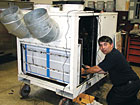
Each Mobile Air portable unit is fully serviced after being returned to the company, so when it goes back out again, the unit is in documented condition.
The company provides mobile air conditioning, heating, and filtration systems for planned and emergency equipment outages. A new business unit, Mobile Dryforce, will be offering humidity solutions, like moisture removal for remediation or new construction projects.
The business started out in mobile heating. “We are in a colder climate,” said co-owner Mark Henry. “Half of our business is heat. The heat brought us into the cooling and filtration world.”
One of the new division’s first projects involved the Blessed Sacrament Cathedral, the central location of the Catholic Church’s Archdiocese of Detroit. According to Henry, it was a mold remediation project in the spacious attic where a valve had been leaking. Henry said the mold was thick and widespread. The remediation involved cleaning the mold, drying the space (Mobile Air’s portion of the work), repairing the leak, and having a third party test the attic’s mold levels.
CONTRACTOR'S HELPER
The company’s primary customers are mechanical and electrical contractors, hospitals, property managers, and education facilities ranging from K-12 to universities - anyone servicing, managing, or building a new facility, said Henry. When a level of trust has been established between Mobile Air and the contractor, the contractor might direct building owners directly to the company.“We’re an extension of them,” said Henry. “If we fail, it’s also a reflection on the contractor.” That’s why the company works hard to put its best foot forward.
The company’s equipment can be used during planned equipment downtime, allowing clients minimal disruption to their business practices, as well as during emergencies.
“We have conversations with the contractor,” he said. “We have seven branches throughout the Great Lakes area, but I have technicians who do nothing but service and install our equipment. I can have a contractor call me during a heat wave and he is swamped. He needs us, and many times it’s rolling out a little air conditioning. Other times, he may already have his guys there doing work and he wants to bill out his guys’ time. The larger the piece of equipment, the more involved the installation is.”

Mobile Air owner Mark Henry checks the operation of a portable cooling unit in use at a Detroit-area medical imaging clinic, in the waiting lounge.
In the winter, the company’s heating methods control humidity so that the outer walls of the structure are warm, preventing condensation. “We can actually help the building owner earn a point toward LEED certification through our method of controlling humidity during construction,” said Henry.
The company’s portable air purification products provide 99.97 percent HEPA filtration for rental or sale. Typical applications include:
• Portable HEPA filtration.
• Medical facilities.
• Sensitive equipment areas.
• New construction or renovation.
• Mold and odor prevention.

Another Mobile Air portable cooling unit keeps administrative staff cool behind the partition at a Detroit-area medical imaging clinic.
EMERGENCY WORK
In emergency situations, contractors can use companies like Mobile Air to help calm customers down by providing speedy relief. This gives cooler heads the time they need to make the best decisions on long-term solutions - repairing or replacing. “It calms everybody down, gives them time to look for the optimal solution,” said Henry. “When it’s an emergency, it can get pretty hectic.”Other events are planned, like providing continued cooling or heating for critical areas. The predominance of planned or emergency work depends on the time of year. “This time of year it’s mostly emergency based. The projects like the one at Troy Beaumont, those are planned. It’s probably a 50-50 split.”
Portable heating and cooling hasn’t always been widely used, but “It has certainly evolved into something of a necessity,” said Henry; “20 years ago that wasn’t the case.”
Part of that necessity has stemmed from the growing use of electronics in all aspects of business. “Electronics have moved beyond the computer room,” said Henry. “It was always very sensitive, but it was usually centralized. Now every little item is electronic and can malfunction.” This has had a big effect in the medical industry, where sensitive diagnostic equipment can require significant and controlled cooling.
Portable cooling systems could also play a critical role in local communities’ plans to deal with pandemic and other emergency planning. The company’s equipment helps provide negative pressurization, often required to help isolate areas where contagious patients are kept, or to protect those with compromised immune systems.
“All the area hospitals have come to us,” said Henry, to help them comply with backup system requirements. “We send them a letter to put in their file. University of Michigan hospital, Henry Ford, Beaumont - we have a standing PO with them so their backup support is very streamlined. We’ve even gotten involved in some emergency rooms.”
For more information, visit www.mobileair.com and www.mobileairsales.com.
Publication date:06/30/2008

Report Abusive Comment